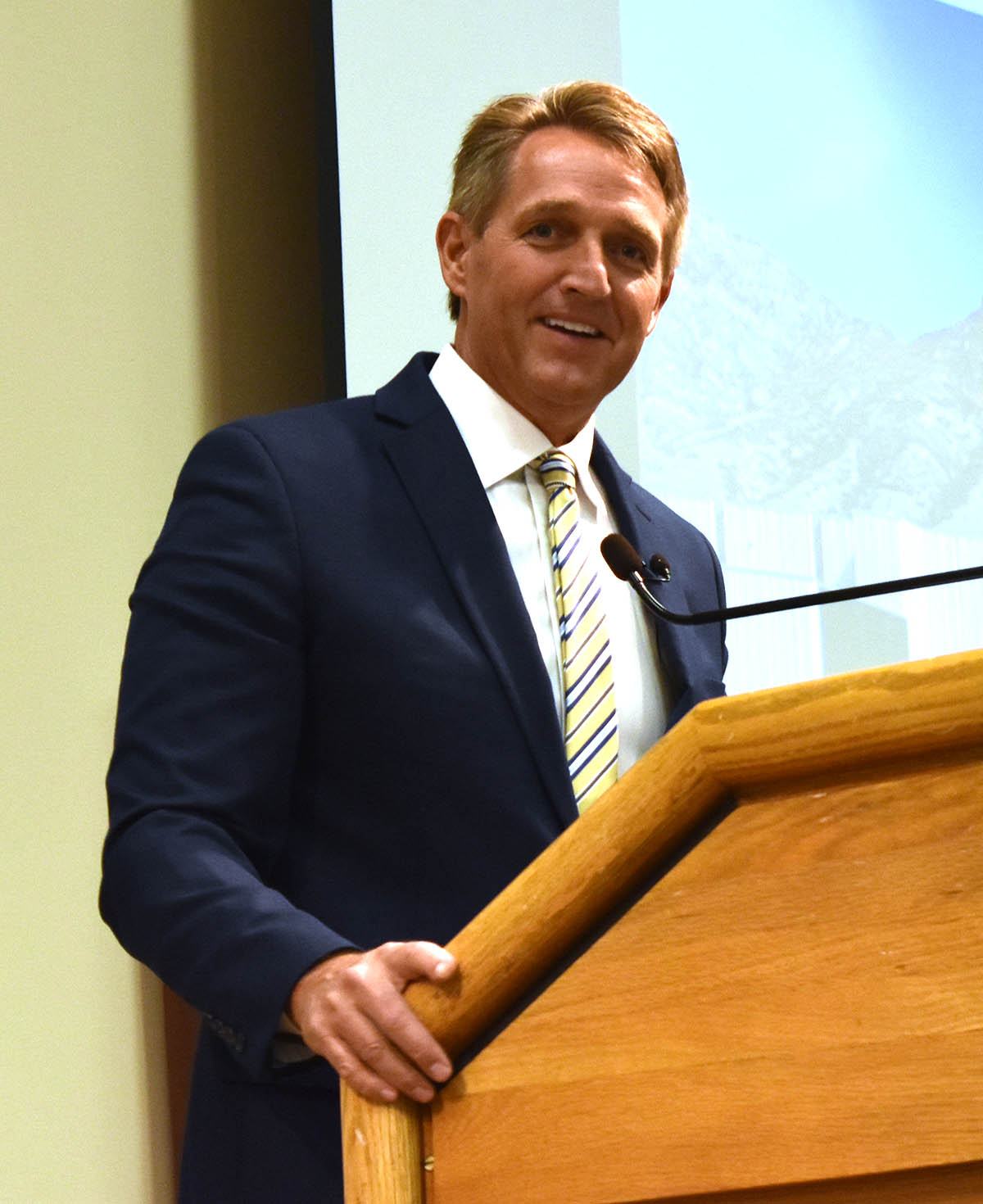Keynote Session: Opening Remarks Summary and Keynote Address – Senator Jeff Flake

by Amy Andrus, 2017 ICLRS Student Fellow
In the keynote session, Dean D. Gordon Smith of the J. Reuben Clark Law School welcomed participants to the 2017 Religious Freedom Annual Review. He stated that during his first year as dean one of his biggest surprises has been the influence of the International Center for Law and Religion Studies (ICLRS). As he travels around the country and the world, he associates with people who are aware of the ICLRS and its work. Dean Smith asserted, “There is nothing we do at the law school that is more important than the work Cole Durham, Brett Scharffs, Elizabeth Clark, and others who work at the Center are doing.” Dean Smith thanked participants for joining in the efforts of the ICLRS and encouraged them to continue promoting religious freedom for the benefit of all.
In his introductory remarks, ICLRS Director Brett G. Scharffs explained that the purpose of the ICLRS and its Religious Freedom Annual Review is to seek “Fairness for All,” which is a central tenet of The Church of Jesus Christ of Latter-day Saints. Scharffs quoted Church founder Joseph Smith, Jr., who said he was just as willing to “die in defending the rights of a Presbyterian, a Baptist, or a good man of any other denomination” as he would be to die for a Mormon; “for the same principle which would trample upon the rights of the Latter-day Saints would trample upon the rights of the Roman Catholics, or of any other denomination who may be unpopular and too weak to defend themselves. It is a love of liberty which inspires my soul––civil and religious liberty to the whole of the human race.”
Scharffs introduced beta versions of four pamphlets the ICLRS produced in partnership with the Newseum Institute’s Religious Freedom Center. The purpose of the brochures is to provide basic information, written in easy-to-understand language, to help citizens better understand their religious freedom rights and responsibilities in the public square. The four brochures address issues that were a focus of this year’s Religious Freedom Annual Review:
- A Parent’s Guide to Religion in the Public Schools: “to help parents understand the religious liberty rights of students and the appropriate role of religion in the public school curriculum”;
- A Teacher’s Guide to Religion in the Public Schools: “to provide teachers with a basic understanding of the issues concerning religion in their classroom”;
- Religious Freedom in the Workplace: An Employee’s Guide: “to give employees a clear overview of their religious freedom rights in the workplace”; and
- Religious Freedom in the Workplace: An Employer’s Guide: “to give employers a clear overview of basic religious freedom rights in the workplace” and provide basic guidelines for formulating “reasonable accommodation” workplace policies.
Scharffs expressed hope that conference participants would use the brochures as tools to help understand and promote fairness for all in the public square.
Senator Jeff Flake of Arizona delivered the keynote address at the 2017 Religious Freedom Annual Review. In June 2017, Senator Flake was present at a congressional baseball league practice when a gunman opened fire, injuring five individuals. Later that month, Senator Flake’s father passed away. Senator Flake stated, “In both feast and famine, I am reassured by the peace and comfort provided by my faith. It has always been so. Every event of significance in my life draws meaning because of my faith, my beliefs, my religion. That is why I so strongly support religious liberty and believe that the rights recognized by the First Amendment are so fundamental. . .. For me, this is not a theoretical or esoteric issue.”
Senator Flake asserted that Americans must stand for religious freedom within our borders, “regardless of the prevailing political winds.” He warned specifically about the adverse effects of a religious litmus test for immigration. Senator Flake recounted how his father-in-law’s life was saved through the diligent, expert care of two physicians who immigrated from Pakistan and Afghanistan, respectively. He stated that “neither [physician] would have been considered a ‘high-value migrant’” at the time of their immigration. “Neither would likely have become who they are had they not made it to America. And neither might have been allowed into America if we had employed a religious test or if we had restricted visas from the majority of Muslim countries compromised by terrorism.”
Senator Flake also admonished that Americans’ efforts to protect religious liberty should not end at U.S. borders. He discussed recent diplomatic inroads made with Cuba, allowing for growth of religious freedom generally and The Church of Jesus Christ of Latter-day Saints specifically in that country. Senator Flake also discussed diplomatic, legislative, and administrative efforts that paved the way for missionaries––including his own son––to receive religious visas to serve in Botswana after such visas had been denied by the Botswana government for four years.
Senator Flake concluded by commending conferences such as the Religious Freedom Annual Review that advance protection of individuals’ inherent rights to religious freedom within the United States and around the world.